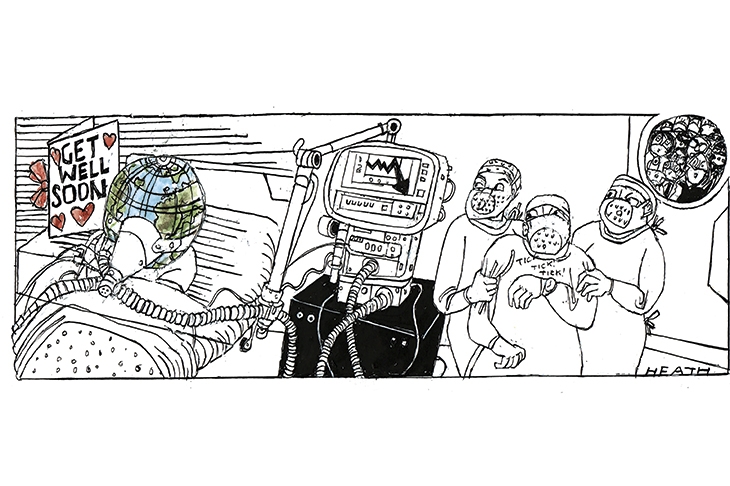Home
The number of people with the coronavirus disease Covid-19 who had died in hospitals by the beginning of the week, Sunday 12 April, was 9,875, compared with a total of 4,313 a week earlier. Three days later it was 12,107. Boris Johnson, the Prime Minister, was discharged from hospital after a week, three days of which were in intensive care. Thanking staff and nurses who saved his life ‘when things could have gone either way’, he said: ‘We will win because our NHS is the beating heart of this country. It is the best of this country. It is unconquerable. It is powered by love.’ He recuperated at Chequers despite harsh criticism of other ministers for moving between town and country houses. It had fallen to Dominic Raab, the First Secretary of State, to act as primus inter pares in the government. He said that the 21-day review (initially by 16 April) written into the Coronavirus Regulations 2020 would not see a raising of the lockdown.
In an Easter radio message, the Queen said: ‘Dark as death can be — particularly for those suffering with grief — light and life are greater.’ The Archbishop of Canterbury, the Most Revd Justin Welby, appealed to crematoriums and local authorities: ‘Don’t just dispose of bodies like we did in the foot-and-mouth episode with cattle.’ Nick Adderley, the chief constable of Northamptonshire, said that if people didn’t heed his warning, police would start ‘checking the items in baskets and trolleys to see whether it’s a legitimate, necessary item’. Shop sales of flour had increased by 92 per cent in the four weeks to 22 March. The Office for Budget Responsibility warned that the economy could shrink by 35 per cent by June. The government extended by billions its overdraft or ‘ways and means’ facility with the Bank of England. The Jewish Chronicle went into liquidation. Border Force intercepted four boats off the coast of Kent and Sussex and took 72 migrants to Dover.
Parliament was to return, using video link, on 21 April from an Easter recess that had begun on 26 March. Shortages of personal protective equipment were reported by doctors and nurses. Workers walked out of Royal Mail sorting offices, complaining at a lack of social distancing. The Foreign Office chartered 12 flights to bring more than 3,000 stranded Britons back from India. Leonard ‘Nipper’ Read, the detective who brought the Kray twins to justice, died aged 95. Sir Stirling Moss, the racing driver, died aged 90. Tim Brooke-Taylor, the comedian, contracted Covid-19 and died aged 79. Roy Kerridge, the writer and longtime contributor to The Spectator, died aged 79. Stella Morris, a lawyer, said that the father of her sons, aged three and one, was Julian Assange, who lived in the refuge of the Ecuadorian embassy in London until last year.
Abroad
By Sunday 5 April, 104,913 people with Covid-19 had died worldwide (a week earlier the total had been 64,103); 390,219 had recovered. The United States became the country most affected, with 20,086 deaths by Sunday (up from 8,243 a week earlier), 8,627 deaths in New York alone. Italy had seen 19,468 deaths (15,362 a week earlier); Spain 16,353 (11,744). Spain allowed factory and construction workers back to work. France extended its lockdown to 11 May. The global economy would shrink by 3 per cent this year, the worst contraction since the Great Depression, the International Monetary Fund predicted. Unemployment in the United States rose by 6.6 million in a week to 16.8 million. President Donald Trump said he was suspending funding to the World Health Organisation. Bernie Sanders ended his campaign for the American presidency, and endorsed Joe Biden.
The Opec cartel and some allies agreed to cut oil output by about 10 per cent. In Guangzhou, China, where thousands of Africans live, many were evicted from flats and hotels, blamed for spreading coronavirus, scores being left in the street; Nigeria said it was prepared to evacuate its citizens. India extended its lockdown, first imposed on 24 March. Buildings at Penal Colony No. 15, at Angarsk in Siberia, were set on fire as prisoners complained against bad treatment from guards.
President Bashar al-Assad of Syria had used sarin and chlorine gas in the civil war there, according to the Organisation for the Prohibition of Chemical Weapons. The President of Iraq named Mustafa al-Kadhimi, the country’s head of intelligence, as prime minister-designate, the third such nomination in ten weeks. Wildfires approached Chernobyl. CSH






Comments